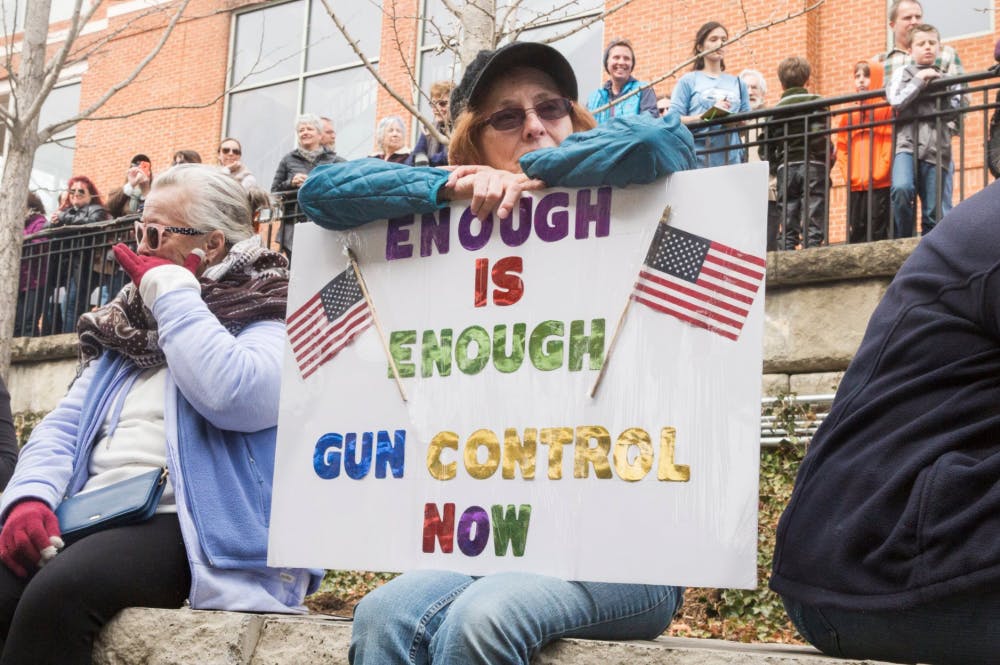Thousands of people filled the Charlottesville Downtown Mall Saturday in support of the “March for Our Lives” movement, joining the efforts of demonstrators across the country marching in solidarity against gun violence.
Prompted by the recent shooting at Marjory Stoneman Douglas High School in Parkland, Fla. which resulted in 17 deaths, as well as many other instances of gun violence across the nation, the March for Our Lives event has evolved into an international movement that seeks increased gun reform with the end goal of effectively stopping school shootings.
The Charlottesville chapter of this movement was organized by Indivisible Charlottesville, the Charlottesville Clergy Collective, Women of the Fifth, Together Cville, Minority Rights Coalition at the University and several other local organizations.
Although the main branch of the march took place in Washington, D.C., more than two dozen marches occurred in large cities throughout the U.S., with many more gatherings in smaller cities and rallies held in solidarity to the movement around the globe.
A crowd of all ages gathered at the Sprint Pavilion in Charlottesville to hear guest speakers address the crowd before the march itself began. Many people held signs that protested gun violence, with written messages such as “Enough is Enough,” “Protect Kids Not Guns,” and “#NeverAgain.” Shouts of encouragement and cheers were heard as each speaker on stage shared their thoughts and experiences.
The speakers prior to the march included children, teachers, local residents, professors and a member of the Black Lives Matter movement. After a spoken-word poem was performed by A.D. Carson, assistant professor of Hip Hop and the Global South at the University, the march began.
Making one circuit around the entirety of the Downtown Mall, citizens raised their signs and their voices as they marched against gun violence. With chants of “Not One More” and “Never Again,” many passersby stopped to watch or film the march as it took place.
Prior to the march, Desiree Sinclair, a 12-year-old student from Tandem Friends School, was the first to present.
“We are your future,” she said. “We children need you, the grownups, to protect us kids. We need to look, to rally, and to make our voices heard with yours. We need you to make our schools safe again.”
Jay Varner, a professor at James Madison University, spoke about his experiences as a teacher explaining gun violence to his students and how to think about the issue.
“Don’t be cynical. You’ve heard this again and again, the media tells you, ‘The NRA is too big, these corporations are too big, there’s lobbying money, you can’t make a difference,’” Varner said. “It’s not true. You can make a difference. All of you are here making a difference.”
Louis Summers, a student at Charlottesville High School, spoke of his experiences as a student who has grown up with school lockdowns and the impact of hearing story after story of school shootings.
“Parkland was not the first school shooting to affect students all over America, but it was the final straw for us,” Summers said. “The nation having to move on to the next mass shooting after only weeks should not be a regular occurrence, but it is. Students fearing being singled out for their race, ethnicity, gender, sexuality, religion, etc. during a shooting should not have to happen, but it does.”
The University and high schools in Charlottesville and Albemarle County joined thousands of other schools and universities across the country in a National School Walkout against gun violence March 14. The walkout took place one month following the Parkland shooting and lasted 17 minutes, in honor of the 17 individual who lost their lives at Marjory Douglas High School.
The University’s Minority Rights Coalition also held a march against gun violence March 14 which began at the McIntire Amphitheatre and ended in front of the Rotunda. The event also focused on the effect of gun violence within minority communities.
Summers then emphasized the need to get involved in politics and vote for candidates that will represent the reform people want, a sentiment echoed by Rashaa Langston, a sophomore at Virginia Commonwealth University, who also gave a speech.
“[We need to be] really looking into who these candidates are and what they stand for … emailing, writing letters, calling, doing everything to get the word out that we want change,” Langston said. “We want these laws, or else they do not get to represent us any more.”
A member of the Black Lives Matter movement then addressed America’s culture of gun-ownership and its relation to a large variety of intersectional issues. The focus on intersectionality directly tied in to why many of the other organizations that were present supported the march — out of an awareness that gun violence is tied to various components of identity with long-reaching implications.
People both native to Charlottesville and from out of town participated in the march.
“Every life is sacred, and we need to do more to protect the lives of our citizens in the United States of America,” said Laura Chonoles, a Virginia resident who said she drove from out-of-town to participate in the march. “I particularly wanted to come today because I feel like the activism of the students in Florida needed to be supported.”
Xavier Jones, from Harrisonburg, spoke about why he was motivated to travel to attend the march.
“Because enough is enough,” Jones said. “It should have been enough at Newtown. It should have been enough at Columbine.”







